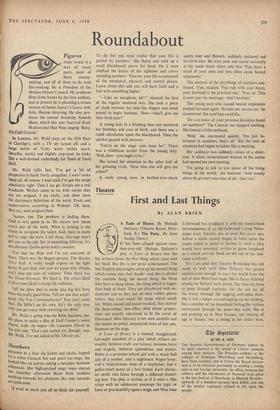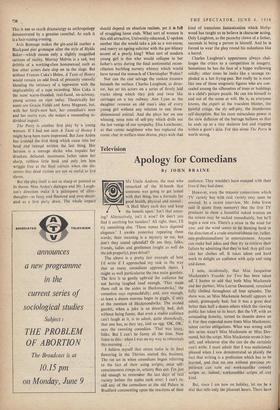Theatre
First and Last Things
By ALAN BRIEN IT has been alleged against nine- teen-year-old Shelagh Delaney's play A Taste of Honey that she has written down the first thing which came into her head. But this is her great achievement. The best English playwrights serve up the second thing which comes into their heads—and this is always the cautious thing, the decent thing, the thing they have a thing about, the thing which is bigger than both of them. They are disinfected with en- thusiasM and so they put on their rubber gloves before they even touch the tongs which touch life. White-coated and gauze-masked, they deliver the three-colour, box-office child whose propor- tions are exactly calculated to fit the cover of Illustrated. Miss Delaney is her own midwife and she makes an awful, amateurish mess of her con- finement on the stage.
A Taste of Honey is a boozed, •exaggerated, late-night anecdote of a play which slithers un- steadily between truth and fantasy, between farce and tragedy, between aphrodisiac and emetic. Helen is a grammar-school girl with a music-hall tart of a mother, and a nightmare Negro lover, and a strip-cartoon dude of a stepfather, and a police-court pansy of a best friend. Each charac- ter swells into focus through a different distort- ing lens. The play is written as if it were a film script with an adolescent contempt for logic or form or practicability upon a stage, and Miss Joan Littlewood has produced it with the knockabout inconsequence of an old-fashioned Living News- paper tract. Twenty, ten, or even five years ago, before a senile society began to fawn upon the youth which is about to devour it, such a play would have remained written in green longhand in a school exercise book on the top of the bed- room wardrobe.
Yet I am glad that Theatre Workshop has not made us wait until Miss Delaney has grown sophisticated enough to trace her world from the out-of-date West End maps. She is Daisy Milford among the Salford back streets. She does not have to peep through keyholes, for she can see all she wants through the sagging ever-open door.' She is not a lodger eavesdropping on the landing, but a member of the household feeling the restless movements through the paper-thin walls. She is not growing up in New Guinea, nor coming of age in Samoa, she is living in her today here. This is not so much dramaturgy as anthropology demonstrated by a genuine cannibal. As such it is a hair-raising evening.
Avis Bunnage makes the gin-and-Id mother a Blackpool pier grotesque after the style of Hylda Baker—which means only a slightly magnified cartoon of reality. Murray Melvin is a sad, wet dribble of a working-class homosexual such as few other actors dare slop on to the stage. But without Frances Cuka's Helen, A Taste of Honey would remain an odd freak of precocity uneasily' blending the intimacy of a tapeworm with the implacability of a tape recording. Miss Cuka is the most warm-blooded, real-faced, un-actressy, young actress on view today. Theatrically her aunts are Gracie Fields and Anna Magnani, but, with her bird's-nest hair, her comedian's nose and her starry eyes, she makes a resounding in- dividual impact.
The Party is another first play by a young woman. If 1. had not seen A Taste of Honey I might have been more impressed. But Jane Arden has avoided the-first thing which came into her head and instead written the last thing. Her heroine is a teenage shrike who impales her drunken, defeated, incestuous father upon her sharp, ruthless little beak and only lets him wriggle free at the final 'cu'rtain when she dis- covers that dead victims are not so useful as live slaves.
But the play itself is not so sharp or pointed as its theme. Miss Arden's dialogue and Mr. Laugh- ton's direction make it a palimpsest of after- thoughts—as fussy and flounced and over-decor- ated as a first party dress. The whole impact should depend on absolute realism, yet it is full of straggling loose ends. What sort of woman is this still attractive, University-educated, U-spoken mother that she would take a job as a wet-nurse, and marry an ageing solicitor with the gor-blimey accent of a pearly king? What sort of modern young girl is this who would collapse in her father's arms during the final sentimental recon- ciliation burbling nursery whimsy which would have turned the stomach of Chwistopher Wobin?
Nor can the cast salvage the sunken treasure beneath the surface. Charles Laughton, as direc- tor, has set his actors on a series of firmly laid tracks along which they jerk• and twist like carriages on a toy railway. Ann Lynn as the daughter remains an old man's idea of every young girl without any relation to one three- dimensional animal. And she plays her on one whining, tense note of self-pity which drills out the last vestige of our sympathy. Elsa Lanchester, as that comic neighbour who has replaced the comic char in welfare-state drama, plays with that kind of tremulous fantastication which Holly- wood has taught us to believe is character acting. Only Laughton, as the paunchy clown of a father, succeeds in being a person in himself. And he is forced to wear the play round his nakedness like a barrel.
Charles Laughton's appearance always chal- lenges the critics to a competition in imagery. Sometimes he has the face of a hippo wallowing solidly; other times he looks like a sausage ex- ploded in a hot frying-pan. But really he is most like one of those enigmatic figures who are con- cealed among the silhouettes of trees or buildings in a child's picture puzzle. He can iris himself in and out of the scene at will. He is, as everyone knows, the expert at the truculent bluster, the painful cringe, the sly self-pity, the thunderous self-deception. But his most miraculous power is the slow deflation of the barrage balloon so that he ends up as a tiny skeleton lost and tripping within a giant's skin. For this alone The Party is worth seeing.











































 Previous page
Previous page